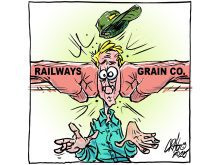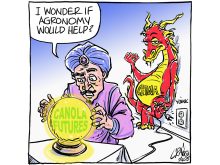A private member’s bill working its way through Parliament doesn’t sound controversial at first blush. Most parliamentarians don’t seem to have thought so, either.
Bill C-293, the Pandemic Prevention and Preparedness Act, was approved by the House of Commons in June by a vote of 164-144, albeit with reservations from some MPs, and is now awaiting second reading in the Senate.
To quote Shakespeare, however, “something is rotten in the state of Denmark.”
Read Also

Invigor Gold variety viewed as threat to condiment mustard
Invigor Gold, the canola-quality mustard developed by BASF, is on a collision course with Canada’s condiment mustard industry. It’s difficult to see how the two can co-exist.
Much of the bill’s wording is what would be expected of a such an act:
- Identify the key drivers of pandemic risk and describe how Canadian activities, domestic and abroad, contribute to the risk.
- Provide for measures, including training, to increase the ability of health-care workers in a range of settings to manage sudden and unexpected increases in patient volume.
- Set out, in consultation with the Minister of Transport, the Minister of Public Safety and Emergency Preparedness and other relevant ministers, the routes by which and rates at which pathogens that could lead to pandemics could enter Canada and a summary of border-related measures that would be implemented to reduce any risk.
So far, so good.
But then there are the “sleeper clauses,” which could certainly be seen as significant threats to farmers if they were interpreted the wrong way by a future bureaucracy.
Here’s the most worrisome one:
“After consultation with the Minister of Agriculture and Agri-Food, the Minister of Industry and provincial governments, provide for measures to:
(i) Reduce the risks posed by antimicrobial resistance.
(ii) Regulate commercial activities that can contribute to pandemic risk, including industrial animal agriculture.
(iii) Promote commercial activities that can help reduce pandemic risk, including the production of alternative proteins.
(iv) Phase out commercial activities that disproportionately contribute to pandemic risk, including activities that involve high-risk species.”
There is also a clause that would provide the environment minister with a summary of land use changes that could contribute to pandemic risk, including “encroachment on wildlife habitats.” What could that mean for farmers?
However, it’s the references to regulating “industrial animal agriculture” and promoting the “production of alternative proteins” that have some folks sounding the alarm.
It may be a bit over the top to accuse the bill’s author of wanting to restrict meat consumption and legislate the consumption of vegetable protein, but this bill needs much more debate before it becomes law.
Those with conspiracy theory tendencies could certainly be tempted to read too much into the fact that the bill’s author, Liberal MP Nathaniel Erskine-Smith, is a vegan.
That might not be fair, but the loaded language used in this bill is definitely enough to cause questions about its true intentions.
Canada has made huge strides in increasing meat safety and reducing antibiotic use in livestock, and more can certainly be done, as is called for in this bill.
However, some of the vague actions mandated in the bill would go too far.
Canada’s livestock and meat sectors had sounded the alarm, so far to no avail, but they need to maintain pressure. They also need to do everything they can to spark a public debate about this bill before things go further.
Senators and the public must be made aware of the potential consequences of the wording in this bill that smacks of over-reach.
Perhaps C-293 is born of good intentions and not malice toward the meat industry, but the end result could be just as bad.
Karen Briere, Bruce Dyck, Barb Glen, Michael Robin, Robin Booker and Laura Rance collaborate in the writing of Western Producer editorials.















